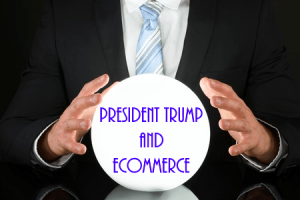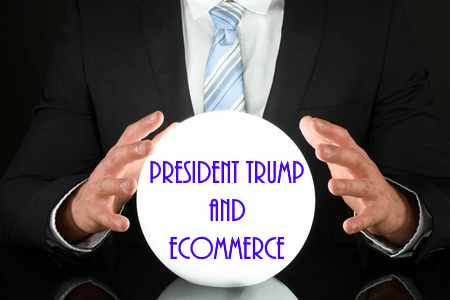 Based on Donald Trump’s background, platform, words, and actions, Internet Lawyer Mike Young makes seven 2017 ecommerce predictions because Trump defeated Hillary Clinton’s quest to carry on as President Barack Obama’s de facto third term.
Based on Donald Trump’s background, platform, words, and actions, Internet Lawyer Mike Young makes seven 2017 ecommerce predictions because Trump defeated Hillary Clinton’s quest to carry on as President Barack Obama’s de facto third term.
1. The FCC Gets Hammered.
The recent attempts by the Federal Communications Commission (FCC) has spent recent years trying to control and regulation Internet activities as a “utility” (like your electric company) instead of an “information service” that has a lot less rules to follow.
How does that change things? You can say adios to the FCC’s enforcement of “Net Neutrality.”
This means Internet content providers that suck up a lot of bandwidth will get eventually get charged more by Internet Service Providers (ISPs) than those who use less bandwidth. And those costs will get passed down. For example, if Netflix is streaming movies to a home where three people are watching different shows and movies eight hours every night, both Netflix and the customer are likely to pay more.
2. Government Contracts will be Reallocated to Smaller Competitors.
With the notable exception of Peter Thiel, from Seattle to Silicon Valley, tech giants (e.g. Amazon, Google, Facebook, and Twitter) were heavily invested in defeating Donald Trump and electing Hillary as President. In fact, it appears that GrubHub is firing employees post-election who supported Trump (so much for free speech).
Aside from being on the Left Coast where it’s cool to be “progressive” and anti-Republican, there’s a monetary motive for the big tech companies supporting Obama and Hillary. To be profitable, many of these companies rely upon federal, state, and local government contracts.
You can expect that, to the extent feasible, there will be a shift in federal government monies away from those companies that dissed Trump in favor of smaller competitors who can deliver.
3. There Will be More Internet Sales Taxes.
Like Hillary Clinton, President-elect Trump came out in favor of Internet sales taxes at the state and local (county/parish and municipal) levels. It appears that his primary reason for doing so is the personal hostility between Trump and Amazon founder Jeff Bezos. Bezos’ Washington Post ran hit piece after hit piece against Trump as news and editorials trying to get Hillary elected.
Unfortunately, Internet sales tax collection will punish small companies that sell online (not Amazon).
Why?
Amazon recognized a few years ago that sales taxes are ecommerce were inevitable so the company shifted its strategy. Instead of denying that warehouses constituted a presence in a state for doing business subject to sales tax, Amazon agreed with state comptrollers and started building/leasing warehouses across the country and collecting sales taxes on purchases made on its websites.
This has spurred growth of the company, including development of brick-and-mortar Amazon bookstores and grocery stores.
Here’s an important point to understand: Amazon has morphed into a technology and logistics company from its inception as an online bookstore.
They developed software to collect sales tax. In other words, they’ll profit from smaller companies paying to license their software for collecting and remitting the taxes to each state, county, and city where a purchase is made rather than be hurt by such taxes.
4. The FTC Will Focus On Tech Antitrust Violations
As his remarks about Amazon have suggested, President-elect Trump believes that some big tech companies are violating antitrust laws through anti-competitive behaviors. You can expect the Federal Trade Commission (FTC) to shift some resources to focus on ecommerce giants to determine whether or not antitrust laws have been broken.
If you work for a large tech company, this obviously isn’t a good thing. However, if you’re an entrepreneur who believes the playing field is unfair because the big companies have stacked the deck with crony capitalism and imposition of onerous regulations the past eight years by Obama bureaucrats, then a breakup of these larger companies may benefit you as you attempt to grow your business online.
Note that the antitrust issue extends beyond a personal grudge match with Amazon. For example, companies like Microsoft and Alphabet Inc. may find themselves spinning off their respective search engines (Bing and Google) if the FTC comes after them.
In historical terms, this type of antitrust action would be similar to the breakup of AT&T’s phone monopoly into the Baby Bells. To avoid a similar fate, Microsoft actually invested in Apple during the 1990s to prop up the company so there was competition.
As an aside, if it looks like the Trump’s FTC is on board with applying antitrust laws to tech giants, you can expect such enforcement to further encourage European Union antitrust enforcement along the same lines.
5. More Snowflakes Will Get Their Feelings Hurt
Encouraged by President Obama, social media icons (e.g. Twitter’s Jack Dorsey and Facebook’s Mark Zuckerberg) have supported politically correct censorship on their platforms on the basis of protecting individuals from “bullying” and “offensive” content.
Needless to say, there has been an inherent left-wing bias built into what constitutes an offense against their speech codes. For example, threats to kill Trump have been routinely ignored while a liberal snowflake with hurt feelings can get someone (e.g. Milo Yiannopoulos) suspended or banned regardless of the accuracy of what had been posted by the offending user (e.g. denying that gender reassignment biologically occurs by genital mutilation surgery).
Perhaps the most important of the 2017 ecommerce predictions for free speech and individual rights, you can expect a Trump administration to disfavor rather than encourage online censorship. State bullying, harassment, and stalking laws will continue to be enforced against actual criminals.
6. International Governance and Segmentation.
Under the Obama Administration, international control of the Internet has been in the process with the goal of making all countries equal players. Because Trump was elected, the ecommerce regulatory obstacles of the proposed Trans-Pacific Partnership (TPP) are now dead.
However, under the auspices of the Internet Corporation for Assigned Names and Numbers (ICANN), international bureaucrats and techies will run the Web’s domain name system (DNS). It remains to be seen whether or not a Trump Administration will be able to reverse this handover of U.S. assets to ICANN.
Because of antitrust and other legal liability issues, it’s probable that ICANN will morph or be absorbed into an international organization like the United Nations (UN) to prevent lawsuits that destroy it.
Regardless, there’s a trend consistent with Trump’s trade policies for nationalism and segmentation of commerce both offline and online.
You can expect that trend to continue with additional censorship within authoritarian regimes and parallel development of a MultiNet, a system by which national and regional Internets interact with each other but the respective rights and restrictions vary within each area and there is an ability and willingness of each government to routinely partially or completely firewall off its Net from other parts of the online world on censorship and national security grounds.
7. Goodbye to Government Green Support.
For the last of the 2017 ecommerce predictions, Internet Lawyer Mike Young notes that President-elect Trump is not a fan of environmental fads and has appointed a skeptic of human-induced climate change to handle the transition matters pertaining to the Environmental Protection Agency (EPA).
Environmental protection resources and government contracts related to energy will be shifted. Instead of subsidizing solar panels, wind farms, and electric cars, expect the federal government to focus on clean coal technologies, oil and natural gas development (including fracking), and nuclear energy.
Although there will still be ecommerce opportunities for so-called “green” alternative activities, companies should not expect the continuation of federal government subsidies for those activities.
Disclaimer for 2017 eCommerce Predictions
Disclaimer: This article was written on November 11, 2016. This means that 2017 ecommerce predictions may not be 100% accurate because of national and global events that will occur after publication.

